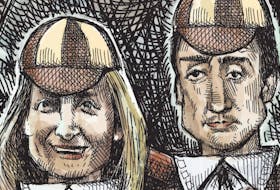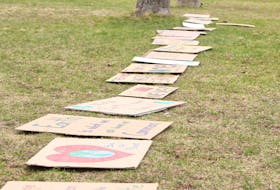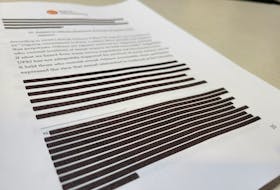The demand for “tax fairness” is failing. Another battle was lost when two one-per-centers — millionaire Prime Minister Justin Trudeau and millionaire Finance Minister Bill Morneau — entered the fray on behalf of the beleaguered middle-class, but quickly realized that challenging a group of wealthy doctors was a miscalculation.
Opposing the tax-fairness warriors is an army of business groups, allied in their efforts to maintain 19th-century ideology in the 21st century — the Conference Board of Canada, the St. John’s Board of Trade, the Newfoundland and Labrador Employers’ Council, etc.

How many centuries out of touch is the business crowd? Well, the N.L. Employers’ Council recently urged the provincial government to cut spending in health care and education, the two most important public services.
Don’t equate “business” with “economics.” They are not the same. Business groups often display ignorance about modern economics, preferring instead the model that was popular in the 1800s.
The St. John’s Board of Trade has been especially clueless, enthusiastically endorsing the obviously doomed Muskrat Falls project and being cowardly silent ever since the dam’s disastrous folly became undeniable.
Whenever a business group makes a pronouncement, think “money.” They represent people who have a lot of it. They think having money automatically makes their pronouncements unassailable. Unfortunately, their self-aggrandizing gambits fool too many people.
But having money does not make a person, or a group, an expert in economics, or reliable regarding economic cures and ailments.
One of this province’s richest men, Danny Williams, gifted his people with the budget-busting, debt-inducing dam in Labrador.
Cue the chirping crickets at the latest St. John’s Board of Trade meeting.
It is almost impossible to win an argument about “tax fairness” with a moneyed person. There is no objective definition of fairness.
Person 1: “Why should I pay more tax? I already pay more in taxes than you earn.”
Person 2: “Exactly. If you earn that much, why should I still have to pay one-third of my salary in taxes?”
The discussion goes in circles. Rational argument holds no sway, because “fairness” is subjective.
Never mind “tax fairness.” Instead, people who want a better economy and more equitable income distribution should demand “tax practicality.”
The various boards and chambers consistently portray themselves as purveyors of practicality whose solutions are grounded in reality and take into account the real challenges faced by society and the public purse, etc. Which would be true, if this were 1843.
Business groups have either forgotten or never knew that a healthy free-enterprise economy relies on a large pool of consumers who have considerable disposable income.
Somewhat ironically, it is a pro-capitalist argument that could defeat the regressive stances often taken by the über-capitalists. Endorsing a strong free-market economy is the best way to achieve “tax fairness,” or, preferably, “tax practicality.”
Business groups have either forgotten or never knew that a healthy free-enterprise economy relies on a large pool of consumers who have considerable disposable income. (“Disposable income” is economist-speak for “money to spend.”)
Income disparity is destroying the free-enterprise economy, and it is epitomized by the so-called 20-80 phenomenon — in modern capitalist societies, the top 20 per cent of wealth-holders own about 80 per cent of the economy’s assets, including cash.
St. John’s Board of Trade chairwoman Dorothy Keating alluded to this in her most recent Telegram column, when she wrote, “Seventeen per cent of the population of N.L. pays 80 per cent of the taxes.”
Assuming the numbers are correct, her interpretation of what they mean — taxes are too high — is backward.
Consider the corollaries: 17 per cent of the people pay 80 per cent of the taxes because they own approximately 80 per cent of the economy’s assets; more tellingly and more importantly, 83 per cent of people pay only 20 per cent of the taxes because they own a mere 20 per cent of the economy’s assets.
If you truly want a healthy free-enterprise economy, more people need more money.
Brian Jones is a desk editor at The Telegram. He can be reached at [email protected].








